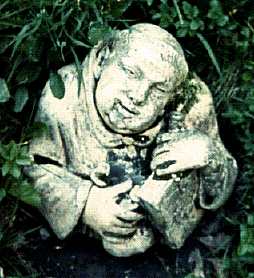The dissolution of the monasteries
The wealth* of the monasteries and the conduct of the monastic orders had long been targets of criticism, although earlier attempts at reform had been unsuccessful.
Henry VIII sought to abolish the entire monastic system in order to add to the royal coffers and to break down opposition to royal supremacy. Between 1535 and 1540 the English monasteries were dissolved, their property and buildings transferred to the crown. Much of the property was bought by or granted to landowners; monastery churches were sometimes converted to parish churches, while some buildings, such as Tintern Abbey*, were left to ruin.
Shakespeare's acting company and a former monastery*.
A pilgrimage of grace?
Acceptance of Henry's changes was by no means universal. The dissolution of the monasteries, and other government intervention in ecclesiastical affairs, met with opposition in a series of uprisings in Lincolnshire and Yorkshire and other northern counties between October 1536 and February 1537. The movement took its name from the most serious uprising, in Yorkshire, which the participants called "this pilgrimage of grace for the commonwealth." At Henry's orders, over 200 people were hanged in connection with the uprisings.
Part of the Catholic Encyclopedia, "The Suppression of the Monasteries" is available on line.
Footnotes
-
There for the taking
The wealth of monastic properties was substantial. When the larger monasteries were dissolved in 1538, their total worth was 140,000 pounds a year, almost half the annual revenue of the church.
-
Prosaic ruin
Shakespeare is probably thinking of such buildings when in Sonnet 73 he writes of the winter boughs of the trees as "Bare ruined choirs, where late the sweet birds sang" ("choir" can refer to the part of the church where the choir sang, as well as to the choristers).
-
From monastery to theatre
Later in his career, many of Shakespeare's plays were performed at the Blackfriars theatre. The Blackfriars had been a monastery, and thus was still considered outside the jurisdiction of the City of London, even though it was within the city walls: thus plays could be performed there despite the opposition of the puritan city fathers.
